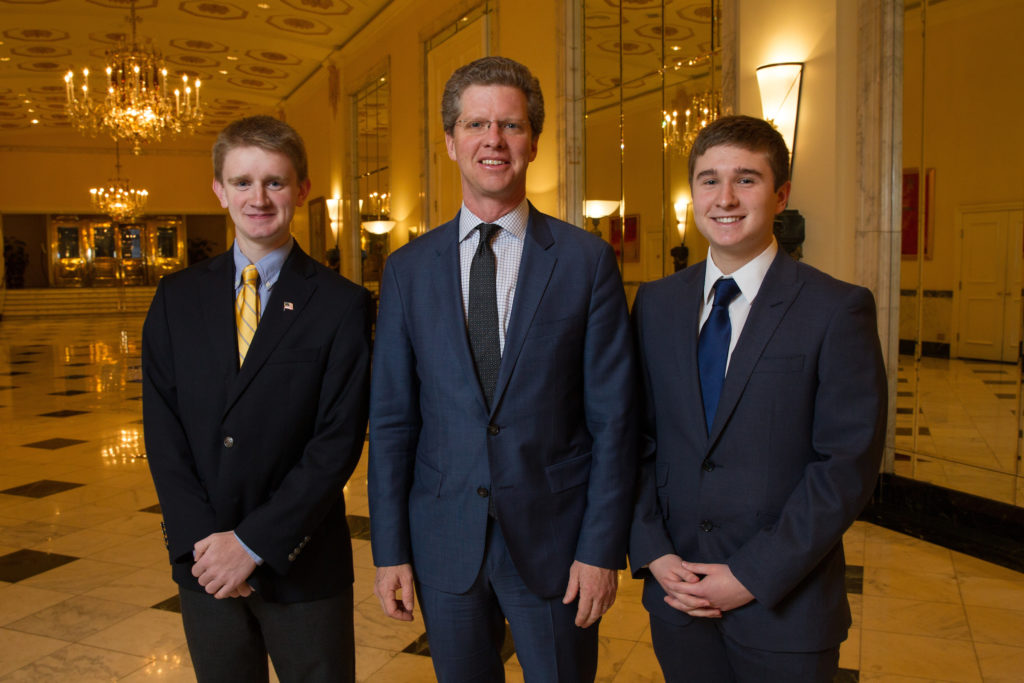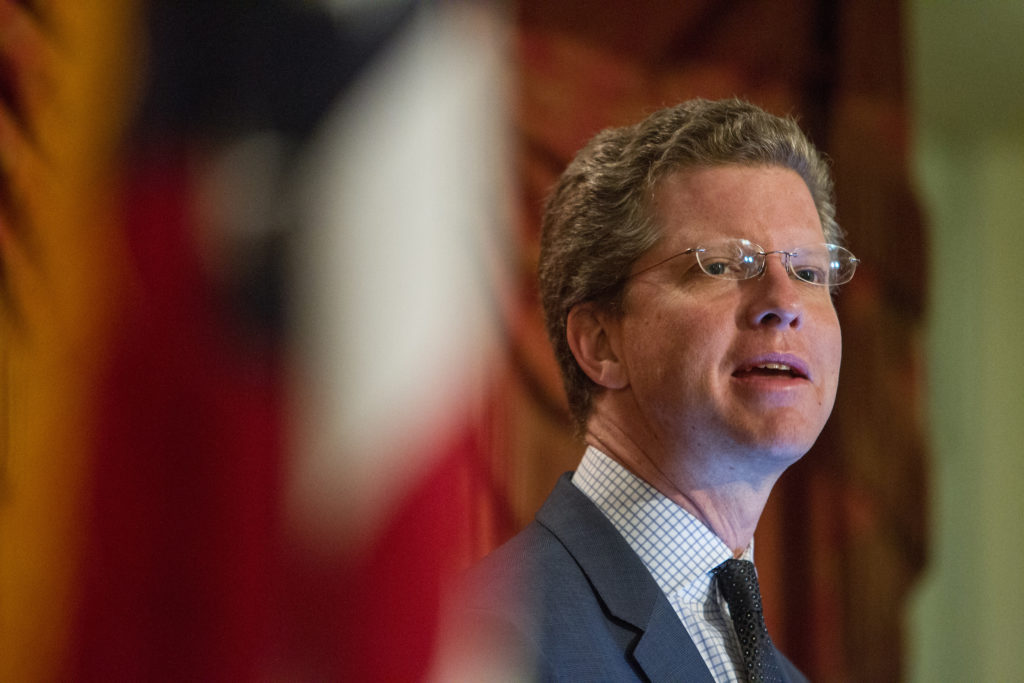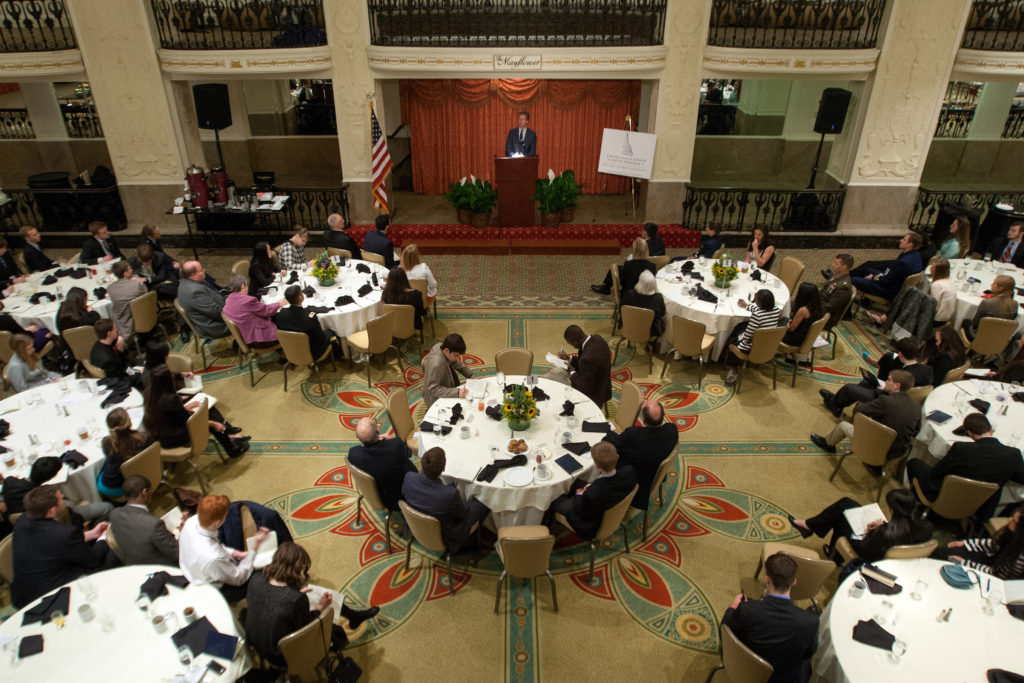
Former Secretary of Housing and Urban Development Shaun Donovan with delegates Jonathan Mack and Troy Bridson.
While it is true that every president of the United States has met with the USSYP delegates during Washington Week since John F. Kennedy in 1963, the student delegates are also fortunate to hear from other executive branch leaders as well. Each year, Cabinet secretaries and other executive leaders meet with the group to discuss the mission of their respective agencies and their passion to serve their Administration and the American people. These events, which always include a long-form Q and A session, are some of the most illuminating of the week for the delegates, as much of a Cabinet secretary’s work may not make the headlines despite the relevance to our daily lives. Highlighted here, as an example, are the lessons from former Secretary of Housing and Urban Development (HUD) Shaun Donovan, who spoke during Washington Week in 2014.
Secretary Donovan served as HUD secretary from 2009 until late 2014, when he became director of the Office of Management and Budget. He was also the chair of President Obama’s Hurricane Sandy Rebuilding Task Force. Secretary Donovan guided the agency at the height of the Housing Crisis and throughout the Great Recession, and then created innovative approaches to rebuilding coastal areas of Connecticut, New Jersey and New York in the aftermath of Hurricane Sandy. Most recently, Secretary Donovan has been serving as Harvard’s senior strategist and adviser to the president on campus development in Allston, Massachusetts and teaching at the Harvard University Graduate School of Design.
His Road to Public Service
Beginning his term on the heels of the Great Recession, Secretary Donovan led HUD at a time of great economic turmoil in the United States. But, he reminded students, that this was not the first period of severe economic shock and social difficulty in our history, or even in his lifetime. He shared: “When I was growing up in New York City, I was witnessing the decline of the South Bronx, but many were talking about the death of American cities, whether it was in the levels of crime, which were dramatically increasing, the desperation of citizens, and this heightened sense that the civic bonds that hold us together were fraying to the point of breaking. It was a time of real fear about the future of cities, but also our country.”
When he began college in the fall of 1983, Secretary Donovan immediately seized an opportunity to begin his career in service, addressing the challenge that galvanized him: homelessness. He told delegates, “One of the very lucky breaks I had was to happen upon a program that sent Harvard students to the Harvard Square Homeless Shelter. It literally started in the spring of 1983, just a few months before I became a student there, and I started volunteering. For three years, I was there, including time on the overnight shift. I went in thinking that my service was a way of helping change these people’s lives. But more than anything, they changed me.”
This pivotal volunteer experience helped him discover that, “Housing could transform lives, because shelter not only gave families a place to stay for a night, but also gave them a sense of hope for the future. It reinforced that the homeless weren’t just a bunch of people or statistics on a page. They weren’t objects to ignore on our sidewalks. They were mothers and fathers. They were LGBT kids searching for acceptance. They were veterans grappling with the scars of war. In short, they were people just like us, who had fallen on hard times, and needed a hand in getting back on their feet.”
Secretary Donovan reflected, “I wanted to be part of this work in some way. I knew that I’d found my passion.” But he shared that like so many of us who feel strongly about a deeply entrenched issue, the problem was what to do next. He said, “When I graduated from college, I came to D.C., and interned at the National Coalition for the Homeless. I decided that I wanted to help by building housing for the homeless, so I went back to graduate school to study architecture. I was very lucky to meet a professor of Housing Policy at the Kennedy School, Bill Apgar, who subsequently asked me to be his teaching assistant, and a few years later, he became the Federal Housing Commissioner in D.C.”
Secretary Donovan went from these early, formative experiences in housing and design to far greater leadership roles, including serving for Mayor Michael Bloomberg as commissioner of the New York City Department of Housing Preservation and Development. Returning to his hometown, he led and implemented the New Housing Market Plan, which built and preserved 165,000 affordable homes, the largest municipal affordable housing plan in United States history. The initiative in New York City provided a national model that gained wide recognition, and he opined that, “Much to my surprise, in 2009, I was asked to join the Obama Administration to serve as HUD secretary.”

Former Secretary of Housing and Urban Development Shaun Donovan speaking to USSYP delegates in 2014.
Leading the Department of Housing and Urban Development during the Housing Crisis
Secretary Donovan took the reins at HUD amid the Great Recession. Speaking to delegates in 2014, when the country had regained a sense of stability, he said, “There is a great deal that I’ve had the privilege to work on over these last five years. We helped millions of families modify their mortgages and fight off foreclosure. Obviously, the housing crisis was a huge challenge when I first started. We provided access to credit so that responsible families can achieve their dreams of home ownership and secure their financial futures. We helped troubled neighborhoods address many of those same challenges that I saw in the South Bronx in the 1970s, abandoned and vacant properties that were a result of the foreclosure crisis.”
But his proudest achievement was the opportunity “to work with the president to launch the nation’s first plan to not just put a Band-Aid on homelessness, not just to reduce homelessness, but to end homelessness in this country.” He continued, “The program is called Opening Doors, and we work with partners all around the country, and we have used innovative approaches that I never could have imagined when I started volunteering at that homeless shelter 30 years ago.”
He shared with the 2014 delegates that this initiative was beginning to bear fruit: “We are making real progress. At a time of economic challenges, where we would expect that homelessness would actually increase in our country, we have made remarkable progress. In the last three years, what we call chronic homelessness—those are the homeless who have been on the streets for a year or more—has declined by 16 percent. We have seen a 24 percent reduction in the number of veterans sleeping on our streets around the country, and I think we can agree that anybody who has risked their life to protect our freedom deserves a decent place to sleep at night. We owe them that.”

Follow your passions
As a lifelong public servant, the 2014 delegates were eager to learn Secretary Donovan’s advice for their careers in public service, and he was happy to oblige by offering these inspirational words: “First of all, just like I did in my career, I followed my passion. You will hear so many people tell you what is right for you, but you will never know what is right for you unless you look inside and remember what it was that made you want to change the world in the first place. Follow that passion. Keep asking yourself where does your moral compass point you, and follow that direction.”
He then offered, “Second, build relationships with your teachers. They can be not just the most important people in teaching you the subjects of school, but they can also be the most important people in your lives in guiding you to what will become your direction in life.”
And lastly, he urged the delegates, “Don’t give up on public service. It is too easy in our current media culture, where the press always wants to cover what is going wrong, it is too easy to miss what is going right in Washington. Every day, I get to work on bringing our families, our youth and our veterans out of the cold and into a home. That is the best possible work I could imagine doing, and we are making real progress. You may not see it on TV at night, you may not read about it in the newspapers, but know that there is always the chance to do that kind of work in public service, every single day.”
© Photos by Jakub Mosur and Erin Lubin
